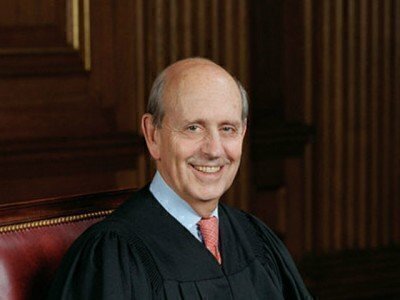Supreme Court Associate Justice Stephen Breyer told ABC News on Sunday he doesn’t see mass internment of ethnic groups in the nation’s future, in a reference to the Court’s 1944 Korematsu decision.
 ABC News correspondent Jonathan Karl tried to use the Korematsu case as a way to get Breyer to comment on Donald Trump’s proposed Muslim ban. Instead, Breyer repeated previous comments he’s made about the controversial case, and deflected any attempts to get the 77-year-old Justice to speak about politics.
ABC News correspondent Jonathan Karl tried to use the Korematsu case as a way to get Breyer to comment on Donald Trump’s proposed Muslim ban. Instead, Breyer repeated previous comments he’s made about the controversial case, and deflected any attempts to get the 77-year-old Justice to speak about politics.
“This country has developed a stronger tradition of civil liberties,” Breyer said about Korematsu’s legacy. “I think everyone I've ever run into thinks that case was wrongly decided.”
“[The Court] upheld it they’re thinking, ‘we can’t run the war, so Roosevelt has to,’” Breyer added.
Breyer has talked at length about the decision by the Roosevelt administration to hold approximately 70,000 American citizens in the camps through World War II.
“By 1944 it was pretty apparent there wasn't a risk of any invasion, and the Court got the case. And by 1944 one of the most interesting parts of this is it was also apparent to the Department of Justice that there had never been a basis for holding these people – never,” Breyer told C-SPAN’s Brian Lamb back in 2010. “And so they knew that in the Department of Justice. And they basically told the Court that, but the Court upheld this imprisonment. It upheld it.”
Trump, the GOP presidential candidate, has started an intense national debate among voters – and scholars – about his proposal to temporarily exclude the entrance of Muslims into the United States until authorities can properly determine a general terrorist threat.
Trump has frequently pointed to the Roosevelt administration exclusion orders since proposed Muslim ban earlier this month. “What I’m doing is no different than FDR,” Trump told ABC on December 7. “If you look at what he was doing, it was far worse … and he’s one of the most highly respected presidents — they name highways after him,” Trump said.
Breyer’s remarks contrast comments attributed to Associate Justice Antonin Scalia in 2014 about Korematsu that have resurfaced recently. Speaking at an event in Hawaii in 2014, Scalia said Americans shouldn’t assume that another Korematsu situation couldn’t occur in a wartime situation. “You are kidding yourself if you think the same thing will not happen again,” Scalia said, citing a Latin phrase meaning, “in times of war, the laws fall silent.”
“That’s what happens. It was wrong, but I would not be surprised to see it happen again—in time of war. It’s no justification but it is the reality,” Scalia said.






